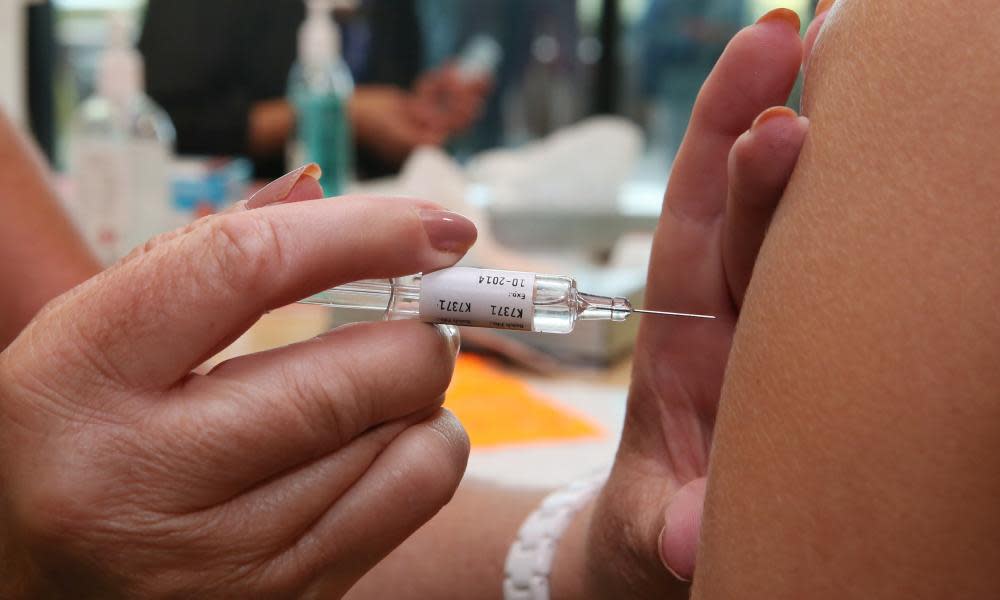Over-12s should be able to get Covid vaccine in Australia without parental consent, say experts

Children aged 12 or over should be allowed to receive a Covid vaccine without the consent of their parents, leading ethicists and paediatricians say, while also calling for clearer national guidelines on the issue.
John Massie, a professor of paediatrics at the University of Melbourne and a child bioethicist, said in a podcast published by the Medical Journal of Australia and in an accompanying piece co-authored with other experts that if those aged 12 and up “have the capacity to understand the nature of the illness … and the procedure and the side effects and the risks, then they should be able to give consent”.
Related: Novavax Covid vaccine: what is it and will it make a difference?
“Our clinical experience has been that some young people are motivated to receive a Covid‐19 vaccine, even when their parents do not wish for them to be vaccinated,” the authors wrote. “How vaccine providers should respond to this request has not been clear.”
Traditionally, parents have been asked to consent to vaccinations of their children, including those in high school, with vaccine providers “usually reluctant to vaccinate, fearing legal consequences or complaints against them” if this consent is not given.
While the federal and some state governments have developed guidelines that allow medical practitioners to treat mature minors without parental consent, some providers are not aware of these and even if they are, are still worried about potential legal issues or find them confusing, Massie said.
“In some states, like Queensland and Victoria, it’s clear that the 12- to 15-year-old group should be able to get vaccinated under their own steam,” he told the MJA Insight podcast.
“In South Australia, Western Australia and New South Wales, you need a parent’s consent, but in NSW it’s messy depending on who you ask.”
However, it is always ethical to assess each child and teenager on an individual basis, Massie and his colleagues wrote, and to vaccinate if certain considerations have been made.
For example, vaccine providers should consider the child’s knowledge about the illness they’re being vaccinated against; talk them through the risks and benefits; try to understand their family context and how their parents may react if they find out; check for any learning difficulties and medical conditions; and consider making the medicare record of 12-to-13-year-olds private.
“This is sometimes called the mature minor doctrine… There is no minimum age for a mature minor, the critical issue is the capacity to make the specific health care decision,” the authors wrote.
They called for any confusion about vaccinating children against parent consent to be cleared through the mature minor doctrine becoming accepted as “standard practice” throughout Australia.
“Parents refusing Covid‐19 vaccination for their children is not in the best interests of the child based on medical recommendations and, further, could be conceived as harmful by failing to reduce the risk of disease due to SARS‐CoV‐2 [Covid-19] infection.”
Dr Catherine Orr, a GP who works for a community vaccination clinic in Melbourne, said she agreed with Massie and his co-authors and that staff had been briefed about what to do if a child said they wanted to be vaccinated against their parent’s consent.
In these cases, the clinician will assess the young person and ensure that they are a “mature minor” and can consent for medical procedures, Orr said. “It’s standard for medical procedures for children under 18. I support it, as I do for any other medical process.”
Dr Nusrat Homaira, a paediatric respiratory epidemiologist in Sydney, said she always tries to work with and educate caregivers when conflicts about medical decision-making for their children arise.
“Within Australia, the paediatric population is considered anyone less than or equal to 17,” she said. “I think for me, the more important issue when speaking about someone 12 or 13 especially is engaging in those vaccine conversations with their parents first.
“We know from our work that healthcare providers like doctors and nurses play a huge role in in communicating risks to parents, and people do make informed decisions if you communicate properly with them.”

 Yahoo News
Yahoo News 
